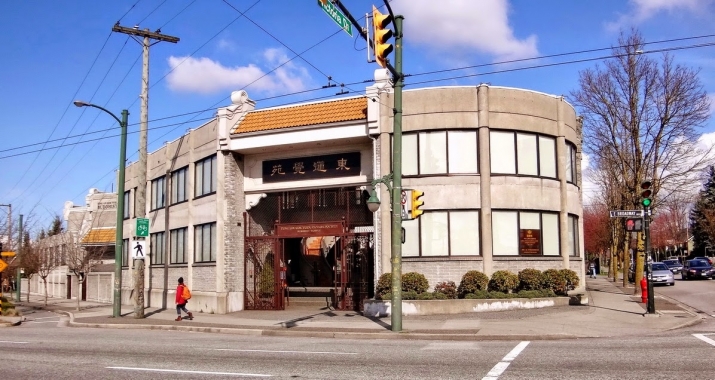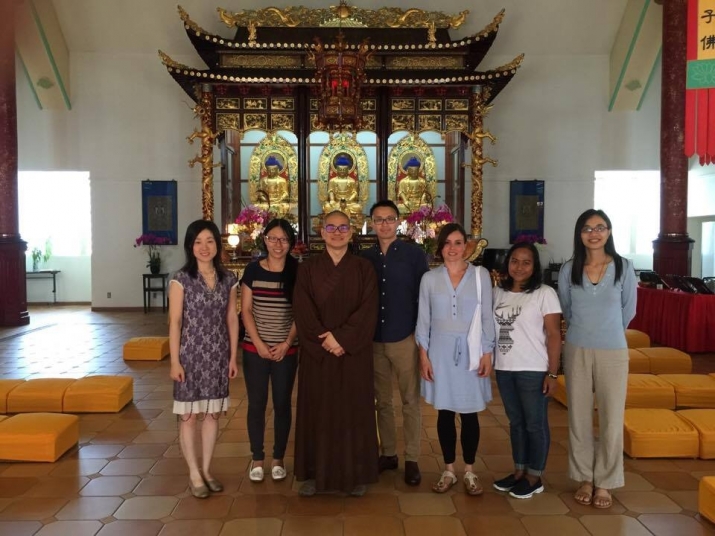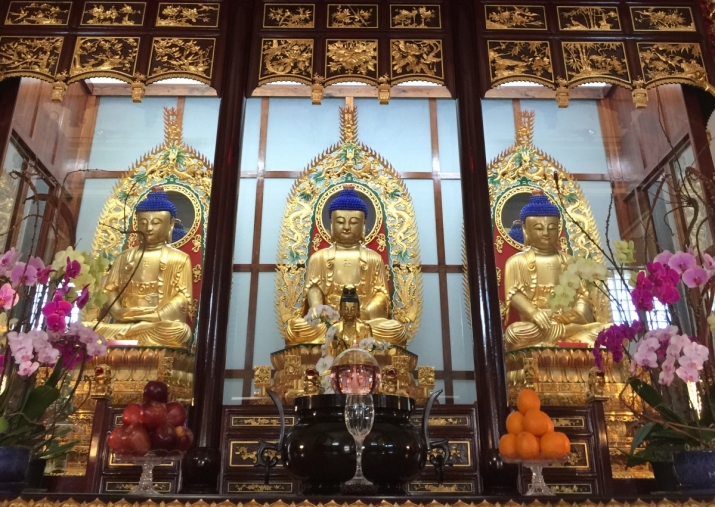FEATURES|REGIONS|North America
Tung Lin Kok Yuen Canada Society: A Warm and Venerable Buddhist Presence in the Heart of Vancouver
 TLKY Canada Society. From sunny1948.blogspot.hk
TLKY Canada Society. From sunny1948.blogspot.hkIn August, I visited the University of British Columbia (UBC) to cover the 6th Annual Tung Lin Kok Yuen Canada Foundation Conference, “Buddhism in the Global Eye: Beyond East and West.” The abbot of Tung Lin Kok Yuen Canada Society (TLKY Canada), Ven. Tian Wen, also attended the conference. He is familiar with Buddhist Studies and its academic importance in helping us to better understand our religious tradition. However, he is also mindful of the pastoral task of making Buddhism meaningful to today’s people and cultures. Ven. Tian Wen is not new to the term “pastoral” thanks to his studies at the Buddhist Ministry Initiative at Harvard Divinity School. Indeed, the pastoral dimension is the reason he is working to broaden and deepen the services of TLKY Canada on the healthcare, cultural, and religious fronts.
TLKY Canada was built in 1994 in the heart of Vancouver’s East Side, at an accessible intersection on Victoria Drive. “The strategic location is one of our great advantages,” noted Ven. Tian Wen. “It’s accessible to commuters and people find it very easy to get here on several bus routes. And the Skytrain, which goes to and from the airport, is less than five minutes away.” The temple’s grey, concrete exterior is of a distinctly modernist style. Only the Chinese-style roof and Chinese characters at the entrance hint at the original inspiration.
The main hall (the da xiong bao dian that can be found in every Chinese Buddhist temple) is a traditional Mahayana Buddhist hall, with flanking chapels displaying Chinese art of the arhats. The somber marble ancestral hall flanked by two staircases is one of the most unique and lovely memorial chambers to teachers and elders I’ve seen. It also has a stained glass window featuring a beautiful and ethereal lotus image.
“What I have gathered is that local Vancouverites are generally very open to diverse ethnic cultures and very respectful of different spiritual traditions,” Ven. Tian Wen told me. “A growing number of people are more receptive to activities such as mindfulness and yoga. If we can draw in people with initiatives that are culturally nourishing, or of practical, everyday benefit, hopefully they won't mind the religious, Buddhist nature of TLKY Canada.”
 Ven. Tian Wen with temple visitors and Raymond Lam at TLKY Canada's main hall. From Buddhistdoor Global
Ven. Tian Wen with temple visitors and Raymond Lam at TLKY Canada's main hall. From Buddhistdoor GlobalVen. Tian Wen’s strategy is twofold: to focus on healthcare, especially for the sick and elderly, and to supplement the temple’s regular Buddhist activities with cultural programs. The first component is not only an important part of contemporary life, but invokes TLKY’s original heritage. “Lady Clara Cheung Lin-kok was always involved in schools and taking care of patients and their family members through visits to hospitals. We hope to continue her legacy and spirit at TLKY Canada.”
Ven. Tian Wen hopes that any forthcoming healthcare programs can involve not just patients and their family members, but also the professionals themselves. “We are planning to set up a caregivers’ support group, which counsels and assists caregivers from the Buddhist perspective,” he explained. “We believe strongly in the idea of taking care of oneself as well as others. This program is English-driven, but we hope to do it in Chinese as well. We have already had talks from several health groups, such as the Cancer Society. The challenge is to do it in a more systematic and organized way.”
Ven. Tian Wen is also looking at ways to cooperate with Lin Kok Manor, the senior care home across the road. At TLKY Canada, he has a program on coping with illness aimed at the elderly. “Over the long term, we want to teach the elderly advanced directives based on the Buddhist insights into sickness, old age, and death. This is already being done in Chinese, but hopefully there will be one taught in English later with healthcare professionals.”
 The three central Buddhas in the main hall's shrine. From Buddhistdoor Global
The three central Buddhas in the main hall's shrine. From Buddhistdoor GlobalOn the cultural front, Ven. Tian Wen emphasized that parents, teachers, and children should be the focus. “We perform rituals in the temple every day and coordinate events that cater to the local Chinese community and English-speaking Vancouverites. We have recently set up a program where we do metta meditations (meditation based on the Metta Sutta) in English and Chinese.” He is keen to hold more classes on Chinese calligraphy and painting as a more neutral and non-religious entryway into the life of TLKY Canada, and is also excited about 12 February next year, when the temple will hold a welcome day for the local community.
“On this occasion of Chinese New Year, we want to try introducing a mindful parenting program. By hosting this welcome day, we hope to attract the interest of local residents, especially young couples and families, since the temple is in the vicinity of several schools. We could start with adults in the mindful parenting program, before enlisting more teachers to help teach a kids’ version of mindful meditation.”
“In terms of our future plans, we will anchor them in contemplative practices, but also take care of the existing Chinese community—especially those born and raised in Canada. The young second and third generations might not know much of Chinese culture, but because of family heritage we want them to have some exposure, including to some of the meditation practices that could help them in their daily lives. We also want to help them understand the ritual practices of Buddhism, if they are open to exploring them,” said Ven. Tian Wen. “Misconceptions arise because of ignorance. If we could explain more clearly the background and rationale of our ritual heritage to the next generation, I think they would be more receptive, or at least more respectful of their elders’ Buddhist religion.
“Overall, we hope that TLKY Canada can be a home for contemplative inquiry: calligraphy, tai chi, healthcare discussion groups, and so on. We want to be a spiritual, but non-sectarian, home of compassion for the Vancouverite community.”
Back to Tradition and Innovation: Chinese Buddhism Beyond Asia Special Issue 2016
Related features from Buddhistdoor Global
Buddhist Explorations in Pastoral Care and Contemplative Counseling














